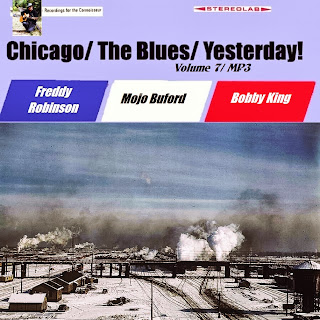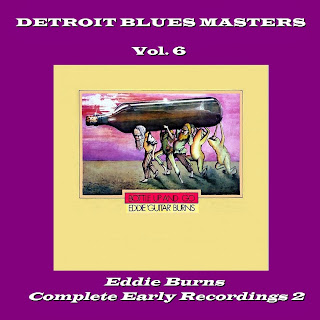CHICAGO/ The Blues Yesterday Vol. 8
 Le chanteur et guitariste (et aussi
pianiste, bassiste) Johnny Twist
(Johnnie Lee Williams), né dans le Mississippi dans les années 30 a suivi le
parcours habituel de bien des bluesmen: des juke joints du Delta aux clubs de
Chicago en passant par Saint Louis. Une figure bien connue de Maxwell Street,
Johnny a été substantiellement présent dans les studios, notamment derrière
Koko Taylor, enregistrant aussi quelques 45t sous son nom. Il vient de resurgir
récemment, tenant une boutique/ musée "Old Dusty's Records" qui lui a
valu un bel article du South Side Weekly. Lui aussi a certainement le potentiel
d'enregistrer un bon album de blues.
Le chanteur et guitariste (et aussi
pianiste, bassiste) Johnny Twist
(Johnnie Lee Williams), né dans le Mississippi dans les années 30 a suivi le
parcours habituel de bien des bluesmen: des juke joints du Delta aux clubs de
Chicago en passant par Saint Louis. Une figure bien connue de Maxwell Street,
Johnny a été substantiellement présent dans les studios, notamment derrière
Koko Taylor, enregistrant aussi quelques 45t sous son nom. Il vient de resurgir
récemment, tenant une boutique/ musée "Old Dusty's Records" qui lui a
valu un bel article du South Side Weekly. Lui aussi a certainement le potentiel
d'enregistrer un bon album de blues.
Enfin, je vous propose la totalité
des morceaux enregistrés par Willie Mc
Neal. Ou pourrait-on dire Willie Mc Neals? Même si plusieurs
critiques et spécialistes pensent que c'est le même Willie Mc Neal qui a gravé
des titres sous les noms de Boll Weevil, Willie Mc Neal ou Big Mac, la
comparaison des voix n'est pas évidente. Rough
dried woman I & II est bien connu (Willie a ajouté sa voix à un
instrumental de Willie Williams - cf l'article à ce nom dans mon blog) mais son
autre 45t l'est beaucoup moins. Pour épaissir encore davantage le mystère, il y
a d'autres artistes qui ont enregistré sous le nom de Big Mac, en particulier
un bluesman de Milwaukee. Quoi qu'il en soit, la musique est ici (et elle est
bonne). A vous de vous faire une idée!
Je regarde le bilan 2013 de ce blog dont
le but est de mettre en lumière des artistes beaucoup trop négligés et il me
paraît assez cossu. Merci de vos avis et remarques qui me permettent de savoir
si ce "travail" (sans aucune rémunération d'aucune sorte) mérite que
je le poursuive.
En attendant, joyeux Noel à tous et qu'en
2014 la "Force blues" soit avec vous!
Gérard
HERZHAFT
As
this Chicago/ the Blues Yesterday series seems to be increasingly popular, here
is a new opus!
Jesse Anderson (born in Paris, Ak. on August,
21st, 1940) has lived in Oklahoma and Wichita (Kansas) - where he led the
Blues Toppers - before going to Chicago during the early 60's. A forceful and
impassionate singer, Jesse became part of a group of young innovative bluesmen
like Fenton Robinson (with whom he co-wrote Somebody
loan me a dime), Earl Hooker, Otis Rush, Syl and Jimmy Johnson. He recorded
a handful of great 45s during the 1960's for several labels (Federal, Cadet, Thomas,
Outta Cyte) in which he mixes perfectly the sounds of the then uprising Soul
Music with the gritty, harsh and gutsy feeling of the Chicago blues. Despite
the very high quality of his music (I got
a problem is a small hit), it was too down home for the new black public of
the 70's and too "Soul" for the mostly white and international public
of the blues revival! And Jesse didn't do too much musically after the early
70's. But this fine singer is still around, willing to perform and record the
first rate blues album that he is certainly able to make.
Johnny Twist (Johnnie Lee Williams) is
a singer-guitarist from Mississippi (born in the 1930's) who was a very
familiar figure of Maxwell Street Market and the Chicago blues clubs. He has
substantially been in the studios during this decade, recording behind several
big names (Koko Taylor) and a handful of 45's under his own name. He is also
still around, keeping a shop (and museum), "Old Dusty's Records"
which gained him recently an article in the South Side Weekly. It should be
nice if Johnny could be interviewed in depth and record the complete blues
album he certainly deserves to make.
Willie Mc Neal (or should I say Willie
Mc Neals?) is quite a mysterious artist. Although several specialists
think that it's the same man who recorded under the names of Boll Weevil, Willie
Mc Neal and Big Mac, it is hard to be affirmative when comparing the voices. If
Rough dried woman is well known and
is in fact Big Mac putting his vocal over an older instrumental track by Willie
Williams (see an article about this bluesman in this blog), his other 45 is
harder to find. There are other people that recorded under the Big Mac's
moniker, namely a Milwaukee blues singer. Who is who? You can make your choice.
During
2013, I've tried to bring the limelight upon bluesmen (and women) who are too
much neglected or mostly unknown. I hope to have been useful and instrumental
in letting blues buffs the world over (re?)discover artists who put their own modest
but important stone to the foundations of the music we love.
As
usual, thank you for your feedback. It gives me the idea if I have to carry on or
not this "work" (without any financial reward of course).
But
now, let me wish you all a Merry Xmas and a Happy New Year!
Gérard
HERZHAFT
CHICAGO/ The Blues Yesterday
Volume 8
JESSE ANDERSON, vcl; Eddie
Caddell, t-sax; Gordon Sims, og; Herbie Welch, g; Carl Wright, bs; Willie
Wright, dms. Chicago, Ill. 27 mai 1960
01. Got a
feelin'
02. I'm gonna
leave you baby
Jesse
Anderson, vcl; Bobby King, g; Sonny Thompson, pno; band. Cincinati, Oh. 22 mai
1962
03. How long
has it been?
04. You better
think twice
Jesse
Anderson, vcl/g; band. Chicago, Ill. 1966-67
05. True Love
Express
06. Swing too
high
07. Get loose
when you get loose
08. You're only a woman
08. You're only a woman
Jesse
Anderson, vcl/g; band. New York City, 1970
09. Mighty
mighty
10. I got a
problem
11. Readings in
Astrology
JOHNNY TWIST (Johnnie Lee
Williams), vcl/g; band. Belleville, Ill. 1962
12. Teach me
how n°1
13. Teach me
how n°2
Johnny
Twist, vcl/g; band. Chicago, Ill. 1964
14. Nona baby
15. Look out
pretty baby
Johnny
Twist, vcl/g; Willie Dixon, bs/vcls; band. Chicago, Ill. 5 avril 1966
16. Go Go baby
BOLL WEEVIL (Willie Mc
Neal), vcl/g. Chicago, Ill. 1948
17. Christmas
time blues
18. Thinking
blues
Willie Mc Neal, vcl/g; pno; bs; dms. Chicago,
Ill. 1956
19. Things
ain't what they used to be
20. Streamline
woman
BIG MAC (Willie Mc
Neal), vcl; Johnny Jones, pno; Hubert Sumlin, g; Eddie Taylor, g; Willie
Williams, dms. Chicago, Ill. 1963-66
21. Rough dried
woman I & II
Big
Mac, vcl; band. Chicago, Ill. 1967
22. That's the
way you treat your woman
23. Bad affair
Big Mac, vcl; band. Chicago, Ill. 1969
24. Come to me
Big Mac, vcl; band. Chicago, Ill. 1969
24. Come to me












